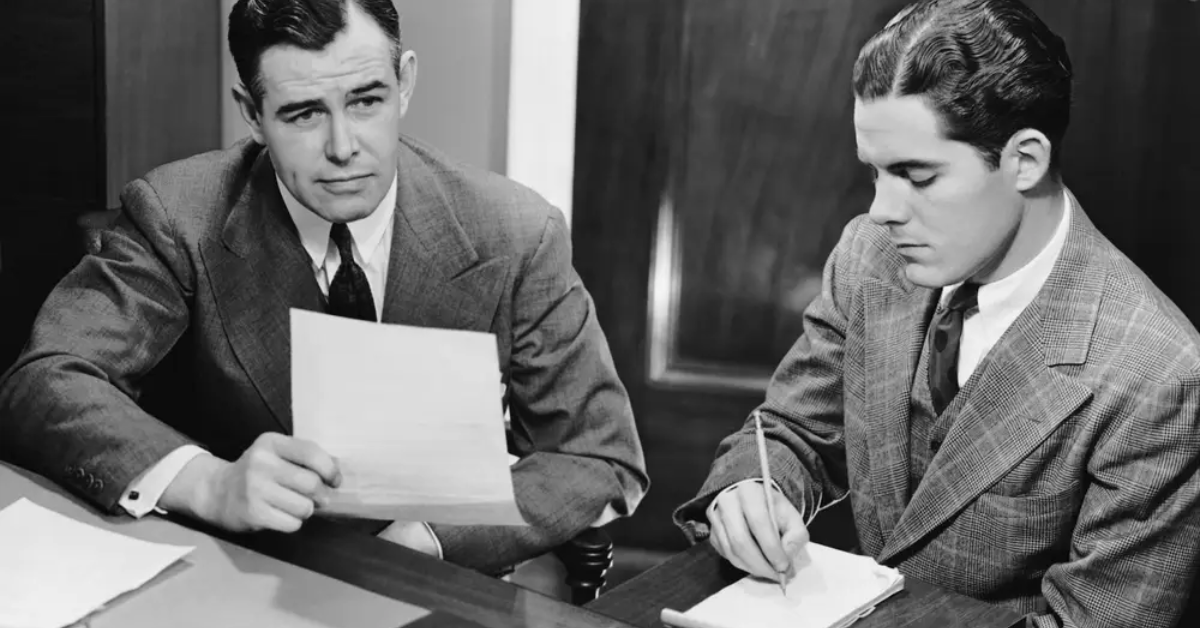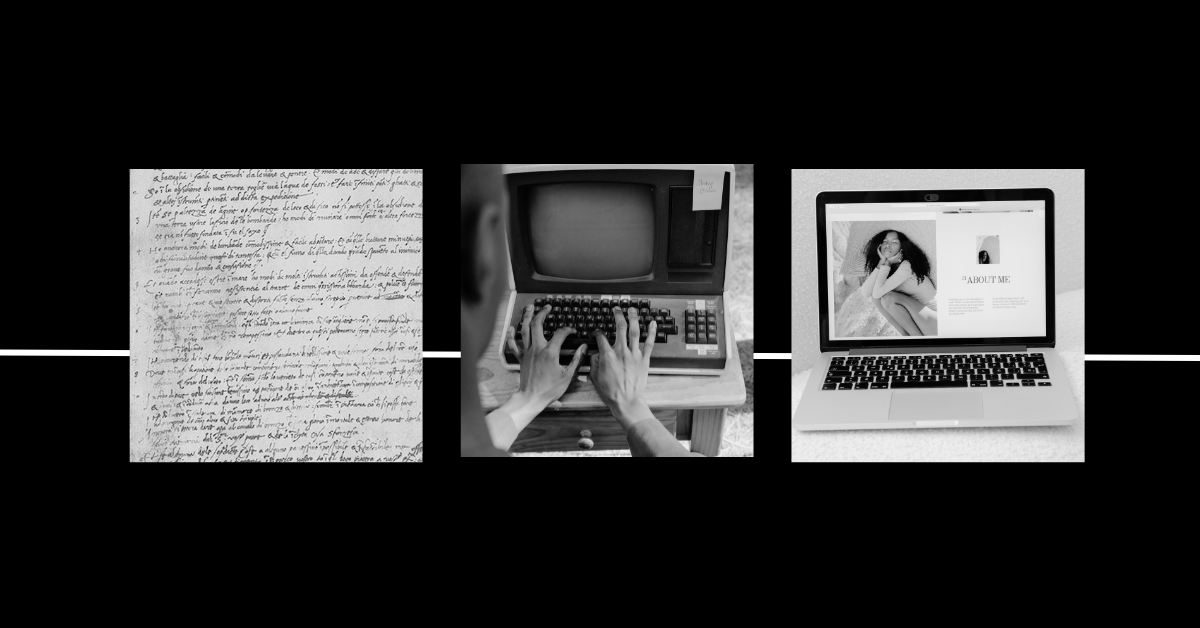The professional resume has undergone a fascinating transformation from its humble beginnings to resumes used in today's modern digital age. The ever-changing landscape of the job market, the advent of new technologies, and evolving societal expectations have all shaped the way job seekers present themselves to potential employers. In this article we discuss the history of the professional resume, exploring its evolution and the impact of technology.
💡 Below we reveal who wrote the first resume – before scrolling, see you if you can guess!
Key Takeaways
- The original resume has been evolving for nearly 500 years (there's a hint!) and has been shaped and molded into the modern resume we know today (and its video resume, online resume, and portfolio variations).
- Technology and online platforms have revolutionized the look, production, and distribution of resumes in the digital age.
- Artificial intelligence paired with professional guidance is becoming increasingly important for crafting a successful resume today.
Who Wrote The First Resume?

None other than Leonardo da Vinci is credited with creating the first official resume in 1482 when he wrote a letter to the Duke of Milan, listing his skills and experience. (Where you right?)
Da Vinci’s letter showcased his abilities relevant to the Duke’s requirements, such as building “mortars” and “covered chariots”. The letter’s intent was to solicit the Duke’s patronage, much like how job seekers today reach out to potential employers through various means, including job applications, resumes, and portfolios.
Here are a few points Leonardo highlighted in his resume:
- He can design bridges that are very light and strong
- He can design mortars and other artillery
- He can design a system of tunnels to pass under walls
- He can create armored vehicles
- He can create various machines useful in wartime
- He can sculpt in marble, bronze, and clay
- He can paint, mentioning that he can do as much as any other person, regardless of who they might be
💡 Read da Vinci's full resume.
This pioneering document laid the foundation for future resumes by underscoring the importance of showcasing one’s education, skills, and experience to potential employers. Interestingly, da Vinci’s initial resume was seen as overly broad and ambitious, a criticism that remains pertinent in today’s resume-writing scene.
The Evolution of Resumes Through the Centuries

In the Middle Ages, English guilds used resumes to display their skills to wealthy patrons, which led to the recruitment of artisans based on their qualifications. However, the evolution of the resume stagnated between the 1600s and 1920s, primarily due to a lack of necessity for highly skilled workers in the era of manual labor.
The early 20th century marked the resurgence of the resume as an essential part of the recruitment process. During this period, resumes began to include basic details such as age, residency, education, and employment experience, making it the era of the first professional resume. By the 1940s, resumes contained more personal information, including height, weight, marital status, and religion. The trend of including outside interests, such as sports and clubs, emerged in the 1960s.
Resumes eventually became an established practice in the 1950s, with various formats ranging from hand-crafted to typewritten. This period also saw the rise of self-help resume books in the 1980s, further cementing the resume’s place in the job application process.
The Impact of Technology on Resumes

The advent of digital typesetting and word processors in the 1970s transformed the look and creation of resumes, leading to more refined documents. Personal computers facilitated the production of professional-looking resumes with relative ease. By 1987, fax machines became a popular method for sending resumes, further expanding the reach of job seekers.
Although da Vinci’s resume is still relevant today, it could be augmented through the use of modern technology, such as the various formatting and editing tools available in software like Microsoft Word and Google Docs. This technological advancement allows job seekers to develop and distribute more visually engaging and tailored resumes, distinguishing themselves in the competitive job market.
Online Revolution: Resumes in the Digital Age
The rise of the internet in the 1990s drastically changed the distribution of resumes, enhancing accessibility and visibility, and improving potential matches for job seekers. As companies began to recognize the potential of online platforms, the first job board site was launched in 1994, quickly followed by others emerging in the space.
Email also transformed the way job seekers submit resumes, making it easier for hiring managers to review and compare candidates’ qualifications and experiences.
The digital era has undeniably altered the dynamics of the job market, offering job seekers increased job opportunities to display their skills and establish connections with potential employers.
Social Media Influence on The Resume

LinkedIn, founded in 2002, has had a profound impact on the the resume. As the first successful professional networking site, LinkedIn enabled individuals to publicly post content, portfolios and resumes, as well as connect with colleagues and hiring managers, and even apply to jobs. Today the platform boasts almost a billion users worldwide, with 171 million residing in the United States. Keeping your LinkedIn profile optimized and up to date has become “table stakes” for those competing in the job market. Learn how to upload your resume to LinkedIn.
Social media in general has become a critical resource for both recruiters and job seekers, with platforms such as Facebook, X, TikTok, and Instagram also playing a role in the job search process. As a result, resumes now often include social media links, making it easier for potential employers to access additional information about candidates.
Modern Trends: Video Resumes, Personal Websites, and Portfolios

Contemporary trends in resume formation include personal websites and portfolios, video resumes, and digital CVs, offering more interactive and visually appealing ways to display abilities and experience.
In the 1980s, recording video resumes on VHS tapes was a trend that ultimately failed to gain traction. However, with the advent of the internet, job seekers can now create professional websites to showcase their portfolios, providing a more comprehensive representation of their skills and accomplishments. As video resumes hit YouTube, this platform offers another way for job seekers to present themselves to potential employers.
As technology persistently advances, job seekers need to keep up with these contemporary trends to maintain competitiveness in the job market.
Artificial Intelligence and the Future of Resumes
The future of resumes may involve AI-powered tools like ChatGPT, which can assist with:
- Content, structure, formatting, and style recommendations
- Keyword optimization
- Ensuring correct language and grammar
- Providing suggestions to better describe skills and experiences
- Guiding users on tailoring their resume based on job requirements
It is likely the traditional resume will stay relevant, but it is clear that the continued advancement of AI and other technologies will play a significant role in shaping the future of resume writing.
While AI tools can help users create more effective resumes, utilizing professional resume writers with a personalized, human touch and experience-based resume-writing knowledge will continue to be a critical part of creating an impactful, tailored resume.
Tips for Crafting an Expert Resume Today

Executive resumes require a focus on emphasizing relevant experience and customizing your resume to match the specific requirements of the job description. This is especially crucial in a competitive job market, where hiring managers often have limited time to review each applicant’s resume.
Optimizing your resume with keywords is another essential step, as it increases the likelihood of your resume being discovered by potential employers. Be sure to research industry-specific terms and phrases that are commonly used in job postings and incorporate them into your resume to improve its visibility in search results. Browse our full list of expert resume writing tips.
Lastly, staying up to date with the latest trends and technologies in the job market is essential. This includes embracing personal websites and portfolios and digital CVs, as well as familiarizing yourself with AI-powered tools, and professional resume writing services that can assist in the creation of your modern resume. By staying informed and adapting your resume to the ever-changing landscape of the job market, you will increase your chances of securing the ideal position.
Summary
The professional resume has come a long way since Leonardo da Vinci’s first attempt in 1482. From its early beginnings to the modern digital age, the resume has evolved, adapting to new technologies and societal expectations. As job seekers navigate the competitive job market, it is imperative to stay informed about current trends, optimize resumes with relevant keywords, and leverage available resources like professional writers and AI tools. By doing so, job seekers can create a lasting impression on potential employers and successfully secure their desired position.
Ready to Get Your Resume Started?
Creating an effective, modern resume can be tricky, but with our team of experts, we make it simple! Our ResumeSpice team is the #1 rated resume writing service in the country. We’ve helped thousands of professionals – from early career job seekers to top-level executives – land their dream job. Our expert team of the best professional resume writers is here to provide resume writing help, career guidance, interview prep, and more. Check out all of our career services here. You can also call us at 832.930.7378 or connect with us online.









